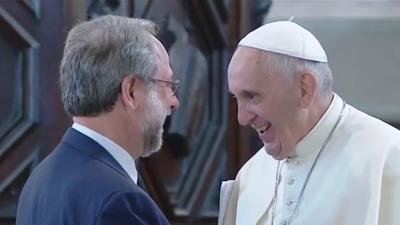Pope asks pardon for persecution of Waldensians

VATICAN CITY - Pope Francis visited Turin’s Waldensian church Monday, and in a historic move asked forgiveness for the Catholic Church’s past persecution of the Waldensian protestants.
Francis became the first pontiff to visit a Waldensian house of worship, after eight decades of strife between the two churches. The Waldensian movement was born 841 years ago, and was ten years later excommunicated and accused of heresy by Pope Lucius III. What followed were years of brutal persecution, bloodshed and life in ghettos for the small Protestant movement.
“On behalf of the Catholic Church I ask forgiveness for the un-Christian, and even inhuman, attitudes and behaviours we have had against you throughout history” the pope said.
The pontiff visited the church, located in the city centre and built in 1848, after the then King of Piedmont-Sardinia, Carlo Alberto (Charles Albert), recognised their civil rights. The movement has only about 45,000 followers worldwide, mostly in Italy, Argentina and Uruguay.
The Waldensian pastor of Turin, Paolo Ribet, welcomed the Pope and added that the visit was greeted “with joy, like a new brother on our path." He then added that by entering into the Church, the Pope had “crossed the historic doorstep of a wall which was built more than eight centuries ago."
He named the visit a “historic” and “encouraging experience”, whilst expressing his desire for future ecumenical experiences in Turin. Francis' gesture can be interpreted as part of his drive to promote Christian unity, which is even more significant given the 500th anniversary of the Protestant Reformation in 2017.
Francis, meanwhile, described his visit to Turin as “a homecoming," making reference to his visit of the church where his grandparents got married, and his father had been baptised.
The Pope spent his first day in Turin visiting the sick at Cottolengo, and then having lunch with young prisoners at the Ferrante Aporti jail.
He also gave a speech to workers, telling a crowd: “A job isn’t only necessary for economic reasons but for the human being, for his dignity, his citizenship and for social inclusion.”
"First of all I express my closeness to the young unemployed, those that have been laid off or those that are poor; but also entrepreneurs, artisans and workers from different sectors, particularly those least able to move forward,” the pope said.
“Turin has experienced a unique and extraordinary day, filled with emotion and affection for Pope Francis,” Turin’s Mayor Piero Fassino said. He then added that the pope had inspired “those least able to move forward”.
The Pope also visited the Turin Shroud Sunday, where he reportedly contemplated the Shroud in complete silence. Later on in the day, he said that the Shroud was "an icon of love".
"The shroud draws (people) to the tormented face and body of Jesus, and, at the same time, directs (people) toward the face of every suffering and unjustly persecuted person." the pope added.


